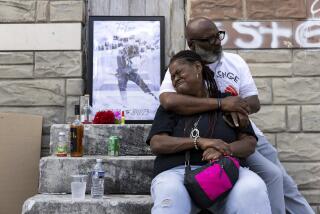Keeping School Dropouts From Dropping Out on Life
- Share via
As a kid, I was mad at society and I was mad at everybody. I was too aggressive, impatient and full of lots of energy. I didn’t feel like I was important at home. I was angry, sad and confused. I couldn’t separate right from wrong.
I guess you could call us “bad,” because our relationships with our parents, schools and home life were all mixed up.
I felt I had a special talent to communicate with sincerity and straight from the heart, but at that time I didn’t see that as a talent. At the youth center in Watts, they specialized in sports, but I wasn’t into basketball or football. There were hundreds of us who were not into sports, so we banded together to rob people of their property, steal from stores and in general just do violent things.
By the age of 9 I was carrying guns, which I got off the streets or stole from people’s homes. I shot people and I got shot, but I was a kid who was robbing while still helping to put shoes on the feet of my homeboys or paying people’s rent. I didn’t believe we had to sit back and hurt. So we kind of did the Robin Hood thing. We robbed from those who we thought were rich, people who were in fact not rich, to get food for ourselves.
Eventually, I was sent to a youth camp for murder. I did a little over a year and I came out even rougher. I was a little more than 15 years old when I met Bob Porter, a blind white man who had one leg. He was living off 37th and Vermont and used to guard Christmas tree lots with his guide dog.
The way I met him was real strange. One day, along with a couple of my “boys,” we startedshooting into the house where Porter lived. He was seated on the front porch and he didn’t bother to duck the bullets, because he was blind and with one leg he couldn’t move that fast. We started making fun of him and, in some weird kind of way, he started screaming at us and got our total attention by pointing out that we were up to no good.
After that, Porter took an interest in me and he asked me to bring my friends to help take trees off the trucks. He used to say, “You’re going to help me with these trees and you’re going to like it.” I fell in love with the man, because he was showing a genuine concern for a kid on the streets of South-Central who had a lot of problems. Now I’m vice president of the Bob Porter Foundation, and every Christmas, I manage the field operation, because Bob died in 1985.
I’m not necessarily a churchgoing man, but I pray all the time. I can only give honor and love to God for the many opportunities that have changed my life. There are thousands and thousands of other very talented black men and women who are not being tapped.
So, my ability to introduce young people to alternative lifestyles remains one of my greatest challenges. Today, I have seven young people on my staff, between 18 and 22, and they all grew up in the housing projects. I have one unit that does mediation while another unit goes out on the streets and searches for kids who have already dropped out of school.
In 1993, we are still finding (school-age) kids who have been out of school for three years. In many cases, the school is right down the block, which means that somebody is not reaching out.
I believe our children are only becoming what is expected of them. They don’t come out of a woman’s belly a gang member or a killer. We have a generation or two of young men who are not being rehabilitated because the system is run by people who don’t understand the plight of young black men in this country.
Over the next five years, I see Common Grounds Foundation becoming a national dropout-retrieval program.
People must be committed to serving kids. What works is always being there. Second, being there to provide resources to nurture their personal development, so they can see themselves not as poor, but as vital individuals who can make a contribution to the community.






